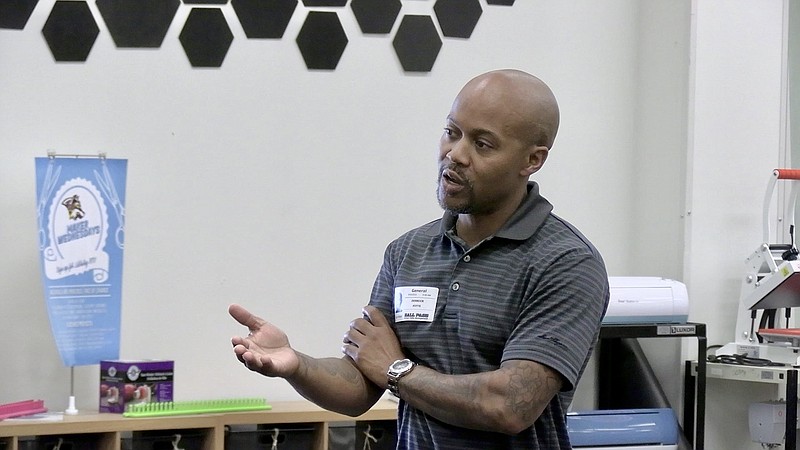PEARCY -- As part of Lake Hamilton High School's Coffee and Careers series, former professional athletic trainer Derrick Fitts spoke to students about a career in athletic training on Friday.
With its primary focus on career exploration, Coffee and Careers features representatives from business and industry talking with students as they enjoy a cup of coffee. Fitts, of Castle Rock, Colo., who now works in medical sales, was an athletic trainer for 25 years with such teams as the Denver Broncos and Denver Nuggets, along with colleges like the University of Florida, the University of Northern Colorado, Kansas State University, the University of Colorado, the University of Tulsa, and the United States Air Force Academy.
"As an athletic trainer, I get the chance to work with different sports teams and take care of the athletes," he said. "The first thing as an athletic trainer is prevention -- so, trying to make sure they don't get hurt in the first place.
"Make sure that they have good muscle balance, that the fields are safe, all those kinds of things. But then, if they do get hurt, it's getting them back onto the field or the court, or whatever sport it is, as quickly and safely as possible."
Video not playing? Click here https://www.youtube.com/embed/gBhDPZFWjeA
Fitts received a Bachelor in Exercise and Sport Sciences, with a specialization in athletic training, at the University of Florida before receiving his master's degree in Kinesiology from the University of Northern Colorado. Working as an athletic trainer, he also attained certifications in nutrition and performance enhancement.
"They all work together ... basically it all has to do with the human body -- how it moves, how it works, and how it functions," he said.
He found his way into athletic training as a high school student when he dislocated his shoulder wrestling. The trainer who helped him recover happened to be a trainer for the Broncos, and he offered him an internship.
"Knowing people and getting into those internships is a big thing. And once you do that, you work hard, then somebody will help you get your foot in the door," he said.
While cons of the career include long hours and unpredictable schedules, working with people and being around sports drew him in. In a slideshow, he showed students photos of him at Super Bowl XXXIII with running back Terrell Davis, as well as him taping up Carmelo Anthony's ankle in the Nuggets' locker room.
"I love athletes; I love being around sports," he said. "I've gotten to be in just about every pro stadium, football stadium, and college football stadium across the country. You know, those kind of things are pros to me. Getting to see an athlete go from being hurt all the way back to being on the field is definitely a pro.
"You get to be outside. I like to be outside and moving. I didn't want a desk job. I didn't want to be sitting behind a desk, you know, eight hours a day. So it's nice that you get to go outside and enjoy the weather."
When asked about the best athletes from each sport that he met during his 25-year tenure, he noted Michael Jordan and John Elway. Elway, in his last season playing, was MVP of the Super Bowl team that defeated the Atlanta Falcons 34-19.
Fitts said that as an athletic trainer, the game is watched differently.
"If I'm at a football game, I'm watching every play to make sure that every one of my athletes get up," he said. "Are they limping? You know, are they grabbing their elbow? What's going on? So you're watching all that at the same time. On top of that, during a game, you've got offense and defense going. But it's very rare, especially in a football game that nobody gets hurt."
He said the worst injury he saw during his 25-year career was a dislocated knee. In fact, he saw two instances. Most people, he noted, think this is when the knee cap comes out, but rather, it is when the tibia and fibula completely come off. It is known as one of the rarest but most painful sports injuries.
"It tears everything: your ALC, your MCL, your LCL. Your femoral artery is jeopardy, and so you could bleed out. And if you walk again, it's great, but you're probably never going to play sports again," he said.
Though, he said, competition is steep in college and professional sports, there are many different avenues for athletic trainers to take, as college bands and many professional corporations also have them.
"In my career, I've been pretty fortunate," he said. "I was with the Broncos for two Super Bowls and when I was at Florida, we won a National Championship. So one of the things when you win championships is they make these gaudy rings, but they make them for the team and the players and for the staff."
He passed the rings around for the students to look at.
"So it's just, again, another one of those things that's kind of a perk or something that's different with athletic training, and getting to work with the team," he said.
